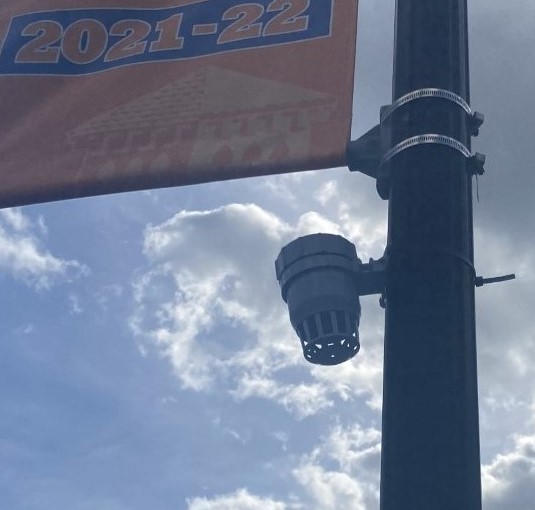Bolles going electric? Environmentally-friendly possibilities in our near future

One of the devices hung above the carpool lane.
Around the campus, students might see some rounded gray devices hanging from poles but not to worry, those are just one of the few sensors Dr. Moyer and his environmental class setup. With these devices in different areas, Moyer will see the difference between high and low levels of pollution on campus within a two to four week span. If these high levels of NO2 are discovered, Moyer’s plan to discuss the idea for electrical buses will push forward.
Moyer has three main motives for tracking NO2 on campus. First, he wants to promote student health: “it has been well known for decades that if you have high levels of nitrogen dioxide it’s bad for health” science teacher Dr. Moyer explained. His second motivation pertains to fewer greenhouse gasses – which means less pollution. Lastly, he hopes to reduce the cost of fuel and maintenance by buying these electrical buses.
Although Moyer is a major advocate for a healthier campus, he gives kudos to the students who are environmentally interested in switching the diesel buses on campus to electrical after attending the COP26 conference (Glasgow Climate Change) with Ms. Kervin.
Kervin explained “our main take from that was small pieces of action such as our food waste, consume habits, use of vehicles, and trying to look at making small actions.”
Ms. Kervin also believes the change for these buses approaches the school at a fast pace. “Some of our buses are coming to the end of their natural life anyway” Kervin explained, “so it’s now time to make that investment.” According to Mr. Butler, director of safety, security, and transportation, Bolles currently owns seven of the nine buses and rents out the other two “which get returned after five years” he explained. School buses can last a long time and “we rotate purchasing a yellow school bus or a white turtle top bus” but hopefully the school will have the possibility of buying an electrical one instead.
Dr. Moyer believes that the school will phase in the new electrical buses “unless somebody brings in a big donation” Moyer said. But even with a slow change of these buses, the school will see the long-term benefits since we use buses all the time such as taking students to the upper and middle school, sport games, and even neighborhoods.
Overall, Moyer with his environmental consciousness hopes that this test he and his students are doing will help the environment. He believes that the possibility of electrical buses on campus will overall be better for our planet but also for the students.


